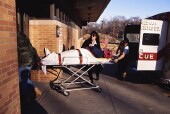- Double Mastectomy May Offer No Survival Benefit to Women With Breast Cancer
- Toxic Lead Found in Cinnamon Product, FDA Says
- Certain Abbott Blood Sugar Monitors May Give Incorrect Readings
- Athletes Can Expect High Ozone, Pollen Counts for Paris Olympics
- Fake Oxycontin Pills Widespread and Potentially Deadly: Report
- Shingles Vaccine Could Lower Dementia Risk
- Your Odds for Accidental Gun Death Rise Greatly in Certain States
- Kids From Poorer Families Less Likely to Survive Cancer
- Tough Workouts Won’t Trigger Cardiac Arrest in Folks With Long QT Syndrome
- At-Home Colon Cancer Test Can Save Lives
Hormone Treatment for Brain Injury Fails to Meet Expectations


Treatment with the hormone progesterone doesn’t benefit patients with traumatic brain injury, a new study finds.
“These results are plainly disappointing,” lead investigator Dr. David Wright, an associate professor and vice chair for research in emergency medicine at Emory University School of Medicine, said in a university news release.
“The preclinical data on progesterone’s neuroprotective effects are compelling, but we were not able to translate them to a multi-center clinical trial with human traumatic brain injury,” he added.
The study was conducted at 49 trauma centers across the United States and was originally meant to include 1,140 patients who would receive either progesterone or an inactive placebo. However, enrollment was halted after 882 patients because of the disappointing results.
Before it was stopped, the study showed that favorable outcomes occurred in 51 percent of patients who were given progesterone and in 56 percent of those given the placebo. The average age of the study patients was 35, and most of the injuries were due to motor vehicle accidents.
Death rates after six months were close to 19 percent in the progesterone group and nearly 16 percent in the placebo group, according to the findings published Dec. 10 in the New England Journal of Medicine.
Previous studies with animals showed that progesterone can protect brain cells after brain injury. And there were also encouraging results from two smaller clinical trials of progesterone treatment after brain injury, according to the news release.
The results of this study “were not what we had hoped,” Dr. Walter Koroshetz, acting director of the U.S. National Institute of Neurological Disorders and Stroke (NINDS), said in the news release. “Scientists must now redouble their efforts to develop treatments that protect the brain and enhance its natural recovery mechanisms,” he added.
The NINDS funded the study.
More information
The U.S. Centers for Disease Control and Prevention has more about traumatic brain injury.
Source: HealthDay
Copyright © 2024 HealthDay. All rights reserved.










